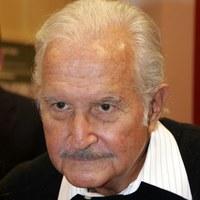Cidade do Panamá (Panamá), 1928 – Cidade do México (México), 2012
By Flávio Aguiar
Considered one of the masters of Mexican narrative, he was a short story writer, essayist, screenwriter, playwright, journalist, and professor. He holds an important place in contemporary Hispanic-American literature for breaking with linear narration. This characteristic is present in his first book, La región más transparente (1958), which in its second edition features a preface by Guatemalan Miguel Ángel Asturias.
The theme of the sociopolitical destiny of the Mexican universe is central to much of his work, as in La muerte de Artemio Cruz (1962) and Terra nostra (1975), a mix of myth, history, and fiction in the anthropogenesis of the Hispanic-American man, a work for which the writer received the Rómulo Gallegos Prize in 1977.
His involvement with political issues in his country led him to create another political organization opposing the Institutional Revolutionary Party (PRI) and to repeatedly take a stance against the actions of the United States, a constant concern that generated several political essays, such as Tiempo mexicano (1972) and El espejo enterrado (1993).
He developed intense cultural activity from the beginning of his literary career with the release of the short story book Los días enmascarados (1954). He collaborated with Jaime García Terrés on the editing of the magazines Universidad de México and El Espectador, and published articles on literature, cinema, and politics in the magazines Mito from Bogotá and Orígenes from Cuba. He served as a judge for the Casa de las Américas Prize in 1963, where he met writers Alejo Carpentier and José Lezama Lima. For Cambio de pie (1967), a book banned by Francoist censorship, he received the Biblioteca Breve prize from the Seix Barral publisher in Barcelona.
He shared the direction of the Obregón Literary Collection with Octavio Paz, co-directed the Revista Mexicana de Literatura, and held the Mexican embassy in France from 1972 to 1976. He wrote critical essays such as La nueva novela hispanoamericana (1969), Casa con dos puertas (1971), Cervantes o la crítica de la lectura (1976), Valiente mundo nuevo: épica, utopía y mito en la novela hispanoamericana (1990), and Geografía de la novela (1993), with a prologue by Tomás Eloy Martínez. He was part of the Latin American Boom generation alongside Mario Vargas Llosa, Gabriel García Márquez, Juan Carlos Onetti, and Guillermo Cabrera Infante.
He expressed in Gringo viejo (1985) another of his great concerns, the social, political, and cultural instability of the border zone, a book about which he said he was “obviously borderland: the border that can be an open wound or a painful scar between Mexico and the USA, but also the fatigue of the USA, this country hungry for new frontiers.” His work in letters earned him the Alfonso Reyes Prize (1979) for his entire body of work, the Cervantes Prize (1987), the Prince of Asturias Prize (1994), and the Rubén Darío Prize (1998). He died at the age of 83, on May 15, 2012.
Other works: Aura (1962); Instinto de Inez (2001). In theater: El tuerto es rey (1970); Orquídeas a la luz de la luna (1982).



